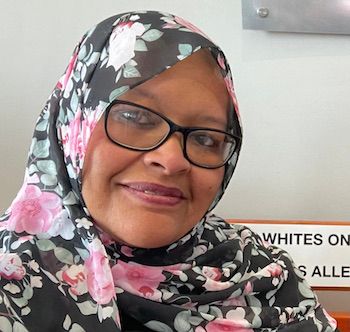Adeebah Sha

Summary: Adeebah Sha takes a hands-on approach to address multifaceted challenges facing her community such as hunger, drugs, gangsterism, gender-based violence, diseases, and poverty. She does this by raising awareness, organizing protests, and facilitating empowerment programmes. After Adeebah’s mother died of cancer, she and her colleagues formed the nonprofit Moms Who Care. Adeebah’s work is self-funded, and her activities in drug- and gang-infested communities are risky; shootings are common. Nonetheless, Adeebah sees her work as not a sacrifice but a duty; she believes that there is always a way to address even the most difficult challenges.
Profile: Adeebah Sha’s mother fell sick from cancer and within a few years succumbed to the disease. Adeebah decided to make something positive out of her grief and, with several colleagues, honoured her mother by founding Moms Who Care, which provides outreach and support to local South African communities.
Adeebah’s philosophy? “Food nourishes the body, and giving nourishes the soul.” Moms Who Care regularly feeds the hungry and destitute, primarily at Adeebah’s expense. In addition, “Besides our regular feeding scheme, Moms Who Care regularly hosts developmental workshops, drug awareness programs, youth events, collection drives, food parcels for the needy and elderly, as well as cancer awareness programs and projects.”
But Adeebah does much more than even that. As the world commemorates the 16 days of Activism against Gender-Based Violence, she and her colleagues organised a silent protest against violence on women and children, which saw about 100 community members attending, lining up in the streets of Hanover Park, and holding placards high
“We found it necessary,” says Adeebah, “to bring about the awareness of gender-based violence in our community before it starts to become the norm. The number of cases has escalated over the years, and we need to make our people aware that it is not okay. And any type of violence, for that matter, is not okay.”
Adeebah encourages men to take the lead against gender-based violence and not be spectators: “It is high time that the men should be the forerunners and speak out and raise their voices regarding GBV. Also, our people need to adopt the attitude that ‘your child is my child, and my child is yours.’” For the victims of gender-based violence, Adeebah encourages community members to “be supportive with the victims and not to be judgmental and play the blame game.”
Adeebah and her colleagues also facilitate different youth programs throughout the year; to date, over 100 participants have been trained in skills that include sewing, archery, bedding, and cooking. One example: “The one session where they cook 100 L pots of food from scratch and distribute it themselves in the community is really the ultimate, because many of them think they are the underprivileged one, but when they feed the destitute, they become more grateful of what they have and feel blessed with what the creator has provided them.” In addition, “We have encouraged young people to complete their matric and study further to achieve their goals and none of them belong to gangs and they also now wish for a violence- and gang-free society.”
In her quest to end drug abuse and its effects on community members, Adeebah introduced an addiction support group. The programme saw addicts and their families benefiting: “Drugs are a major pandemic in our community. Hence, we introduced the program to not just support the addict, but also the families and loved ones of the addicts as well. We create a safe space for them to acquire the necessary tools on how to handle their loved one suffering from addiction.”
Besides using her income to fund her projects, Adeebah’s efforts in all these areas can be risky: Being an activist against gender-based violence subjects her to gender-based violence. Being an activist against gang-induced violence subjects her to gang-induced violence. Adeebah is frequently threatened because of her continual outreach to various communities. Nonetheless, as a devoted Muslim, she believes that even though she operates in locations rocked by gang violence—incidents of people killed by stray bullets is a common feature—“When doing good to nourish the soul, nothing bad will harm you.”
“This is a 24-hours, 7-days-a-week commitment,” she says, “and with the unconditional help of our families that are fully onboard with assisting, we don’t see it as a sacrifice but rather a way of life in servitude of the destitute.”
